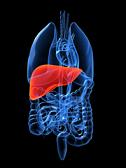Advertisment
Pioglitazone shows efficacy against a chronic liver disease

by Bruce Sylvester: Pioglitazone shows efficacy against the progression of nonalcoholic steatohepatitis, or NASH, a chronic liver disease caused by a buildup of fat. Researchers reported this finding on June 21, 2016 in the Annals of Internal Medicine.
As background, the authors noted that NASH affects 10 to 20 percent of the population and up to one-third of all patients with adult-onset diabetes in the United States. Untreated NASH can cause chronic inflammation leading to liver cancer or cirrhosis. NASH is the second-leading cause of liver transplants in the US.
The investigators enrolled 101 subjects with prediabetes or Type 2 diabetes and biopsy-proven NASH.
All patients received a hypocaloric diet (500 calorie/day deficit from weight-maintaining caloric intake) and were randomized to pioglitazone, 45 mg/day or placebo for 18 months, followed by an 18-month open-label phase with pioglitazone treatment.
The investigators reported that 58% of subjects randomized to pioglitazone achieved the primary outcome of a reduction of at least 2 points in the nonalcoholic fatty liver disease activity score, without worsening of fibrosis, and 51% of these subjects had NASH resolution (both P<.001).
Pioglitazone treatment improved histologic scores, reduced hepatic triglyceride content and improved adipose tissue, hepatic, and muscle insulin sensitivity (P<.001 vs placebo).
Out to 36 months of pioglitazone treatment, all metabolic and histologic improvements noted at 18 months endured.
“The exciting thing is that there is a generic drug [a generic version of pioglitazone] that already prevents the onset of Type 2 diabetes and cardiovascular disease in recent studies. Now, it can reduce disease from excess liver fat accumulation and liver inflammation, and halt fibrosis that leads to cirrhosis. This will have a lot of long-term benefits for many people with a medication that will be very affordable and is already being used to treat Type 2 diabetes,” said lead investigator Kenneth Cusi, M.D., chief of the division of endocrinology, diabetes and metabolism in the University of Florida College of Medicine’s department of medicine in Gainesville, Florida.





